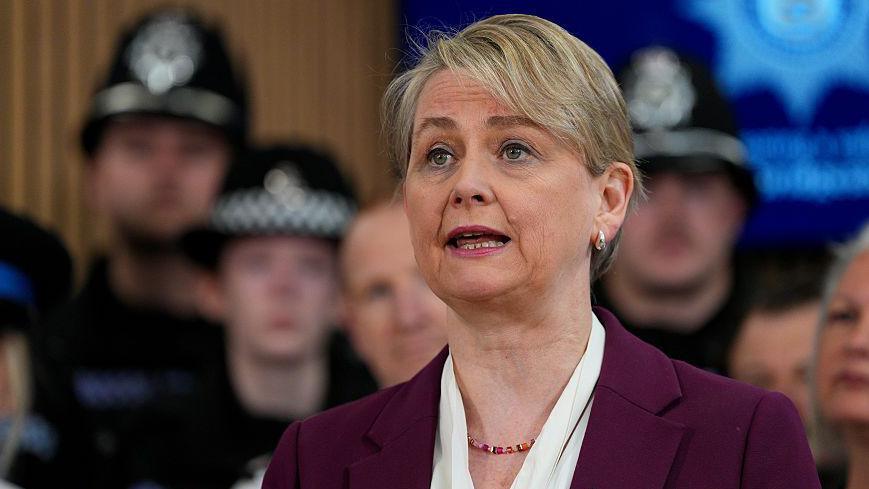Sex offenders to be denied asylum rights in new law

- Published
Asylum seekers will be denied the right to stay in the UK if they have been convicted of sexual offences, the government has announced.
Any offender sentenced to more than a year in prison, as well as terrorists and war criminals, can currently be refused asylum and deported under the Refugee Convention.
The government want to widen the scope to include anyone convicted of a crime that would see them put on the sex offenders register in the UK, regardless of the length of their sentence.
Home Secretary Yvette Cooper said this would "ensure these appalling crimes are taken seriously".
But the Conservatives said the move was "too little, too late".
Government considering sending failed asylum seekers to Balkans
- Published22 March
Nearly 42,000 UK asylum seekers waiting on appeal
- Published17 March
Speaking to the BBC, Cooper said ministers would move to classify sex offences as a "particularly serious crime" - enabling the government to reject the asylum applications of sex offenders.
Cooper also called for "stronger" rules to stop judges blocking the deportation of migrants on human rights grounds, suggesting there could be a new "framework" set by Parliament in future, although she did not provide details.
The government is currently reviewing how the right to a family life contained in Article 8 in the European Convention on Human Rights (ECHR) is applied in immigration cases, with an update expected in the coming weeks.
Article 8 has been used by some migrants and asylum seekers to successfully appeal deportation.
Asked about the issue on Radio 4's Today Programme, Cooper she had "concerns about some of the individual cases" where the government "disagreed" with decisions made in the courts.
"Respect for family life is supposed to be balanced against other issues, including against the public interest, including against the ability for a government to set its own policies, for Parliament to set policies, and for respect for border security and control," she added.
It is not clear how many cases the change could affect.
The planned crackdown would apply to those committing an offence that places them on the sex offenders register in the UK.
The Home Office also plans to apply the change to those convicted of sex offences abroad, if it would have qualified them for inclusion on the register in the UK.
Under sentencing guidelines, external, most sexual crimes in England and Wales carry recommended prison terms beyond a year.
But first-time offenders and less serious examples of sexual assaults, exposure, and sexual communication with a child could lead to custodial sentences of under 12 months.
Cooper said the changes would help tackle instances like that of Abdul Ezedi, who was granted asylum despite being a convicted sex offender.
Ezedi killed himself within hours after he was suspected of dousing his ex-girlfriend with a corrosive liquid when he attacked her and her children in south London in January last year.
He was already on the sex offenders register, after pleading guilty to charges of sexual assault and exposure in 2018, when he was granted asylum in 2020 following two failed attempts.
The changes will be introduced through an amendment to the Border Security, Asylum and Immigration Bill, which is currently making its way through Parliament.
The government also plans to set a 24-week deadline for appeals by foreign offenders and housed asylum seekers, aiming to cut the backlog.
'Spurious legal claims'
Conservative shadow home secretary Chris Philp said the legislation was "too little, too late" and highlighted how a record 10,000 people had crossed the Channel this year already.
"Foreign criminals pose a danger to British citizens and must be removed, but so often this is frustrated by spurious legal claims based on human rights claims, not asylum claims," he said.
"The Conservatives had already tabled tough, clear reforms to remove all foreign criminals and to disapply the Human Rights Act so activists and lawyers cannot block deportations.
"But Labour voted against our measures - they are not serious about controlling our borders."
The Home Office said that harnessing artificial intelligence (AI) for processing asylum claims could also save up to an hour per case by summarising interview transcripts and accessing country advice.
A range of measures to reform the asylum system are being introduced, including new powers for the Immigration Advice Authority to issue fines of up to £15,000 for anyone involved in advising fraudulent claims or posing as an immigration lawyer who is not registered.
There will also be restrictions on foreign offenders living in the community, including mandatory electronic tags, strict night-time curfews and enforced exclusion zones.
Enver Solomon, chief executive of the Refugee Council, welcomed efforts to resolve asylum cases quickly, but warned the use of AI could "backfire" if it produced flawed decisions that end up in the courts.
The Law Society of England and Wales also raised concerns that the target for appeal decisions would be "unworkable" in practice, as the justice system is already struggling to cope with current demand.

Sign up for our Politics Essential newsletter to read top political analysis, gain insight from across the UK and stay up to speed with the big moments. It'll be delivered straight to your inbox every weekday.